An Hand, Husb, & Nutrition Midterm (MSU VMT)
1/55
There's no tags or description
Looks like no tags are added yet.
Name | Mastery | Learn | Test | Matching | Spaced | Call with Kai |
|---|
No analytics yet
Send a link to your students to track their progress
56 Terms
Habituation
-most simple form of learning
-an animal's ability to adjust to an insignificant stimulus. The stimulus does not affect the animal's day-to-day life
Classical Conditioning (Pavlov)
when a learner associates a previously meaningless stimulus with one that already evokes a response
-animal is not aware of responses
Unconditioned stimulus
something that elicits an unconditioned response
Unconditioned response
the response to an unconditioned stimulus
Conditioned stimulus
a neutral stimulus that is paired with a with an unconditioned stimulus until a response occurs
Conditioned response
a response to a previous neutral stimulus
Operant conditioning
-negative punishment and positive reinforcement
-known as instrumental conditioning
-a form of learning in which consequences drive future behavior
-animal has voluntary responses
Chaining
performance of a series of operant responses in sequence
ex: sit, shake, lay down, rollover
What are the 2 purposes for cows?
Beef cows and dairy cows; production
What are the main components of cow husbandry?
-Behavior• Housing• Nutrition• Identification• Reproduction
Cow vision
monocular and binocular in the front
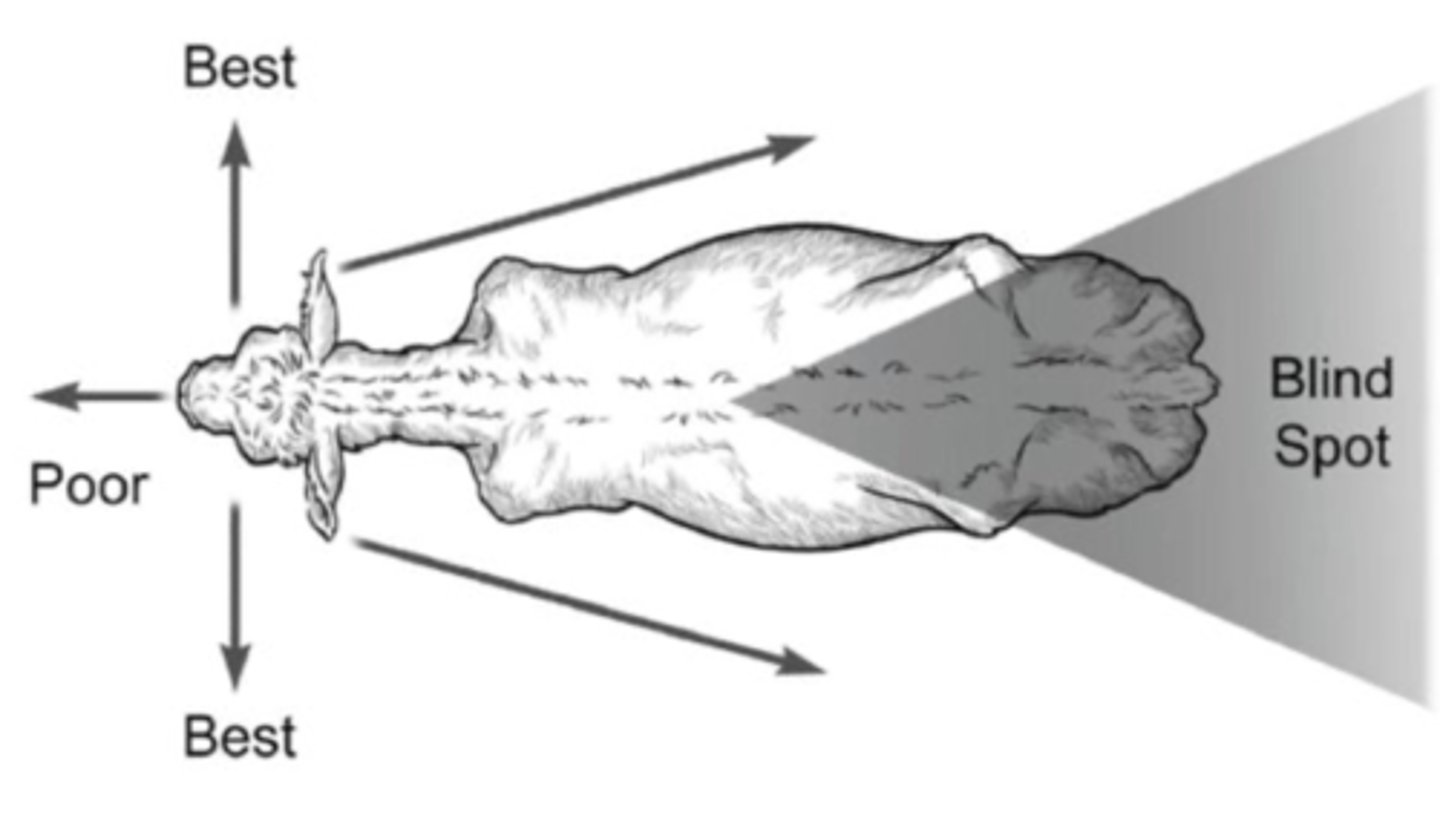
Beef cattle housing
hoop barns(greenhouse), open sided barns(most commonly used
Dairy cattle housing
free stall barns, bedded pack barn
Calf housing
mainly raised in hutches but can be grouped
Ear tagging
-most common identification method
-can color coordinate or put on different ears
-tag goes in middle third of the ear
Hot branding
-lesson common bc of the damage on the hide
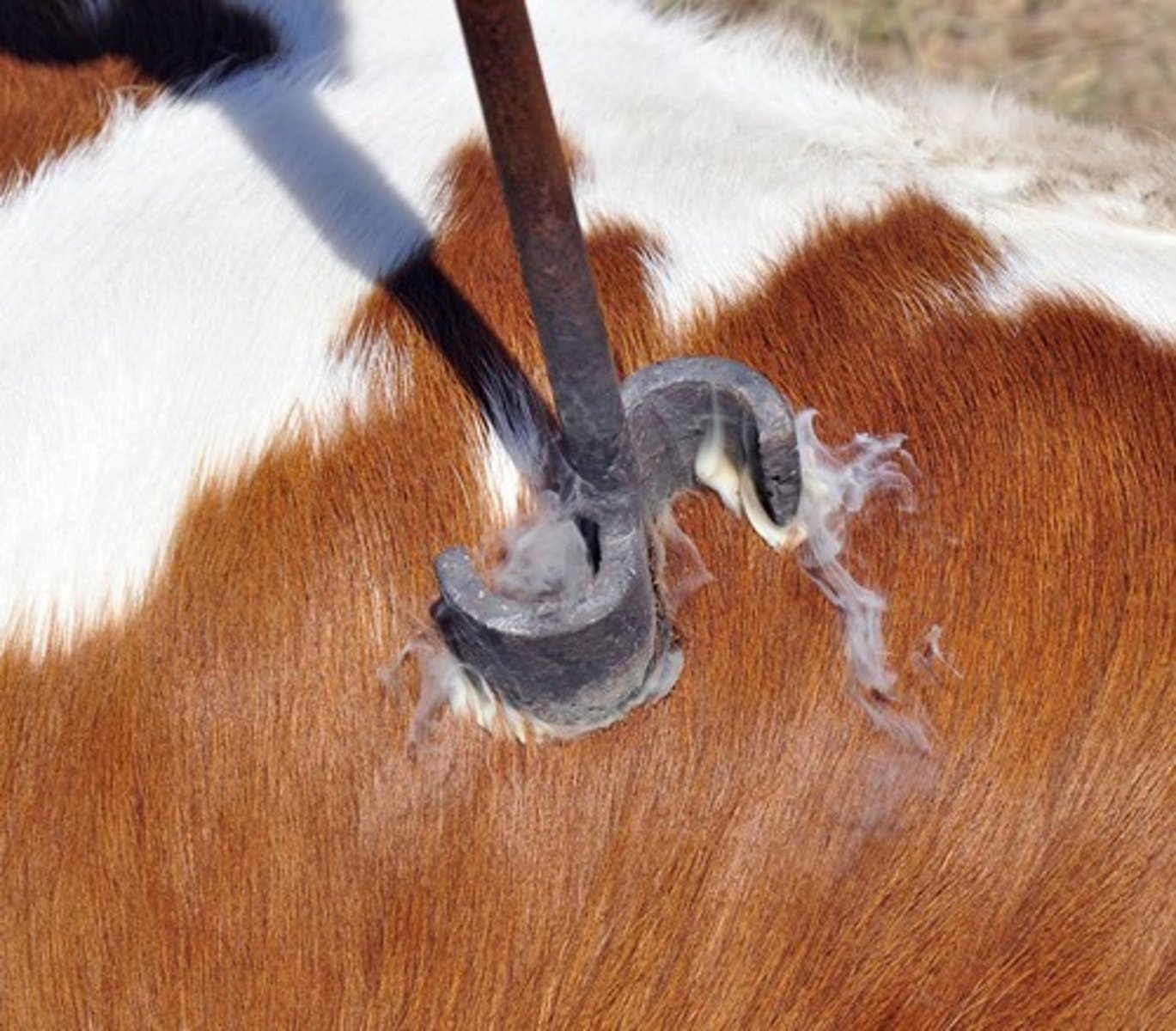
Freeze branding
-becoming more common
-freezes hair follicles to make it look white
-liquid nitrogen
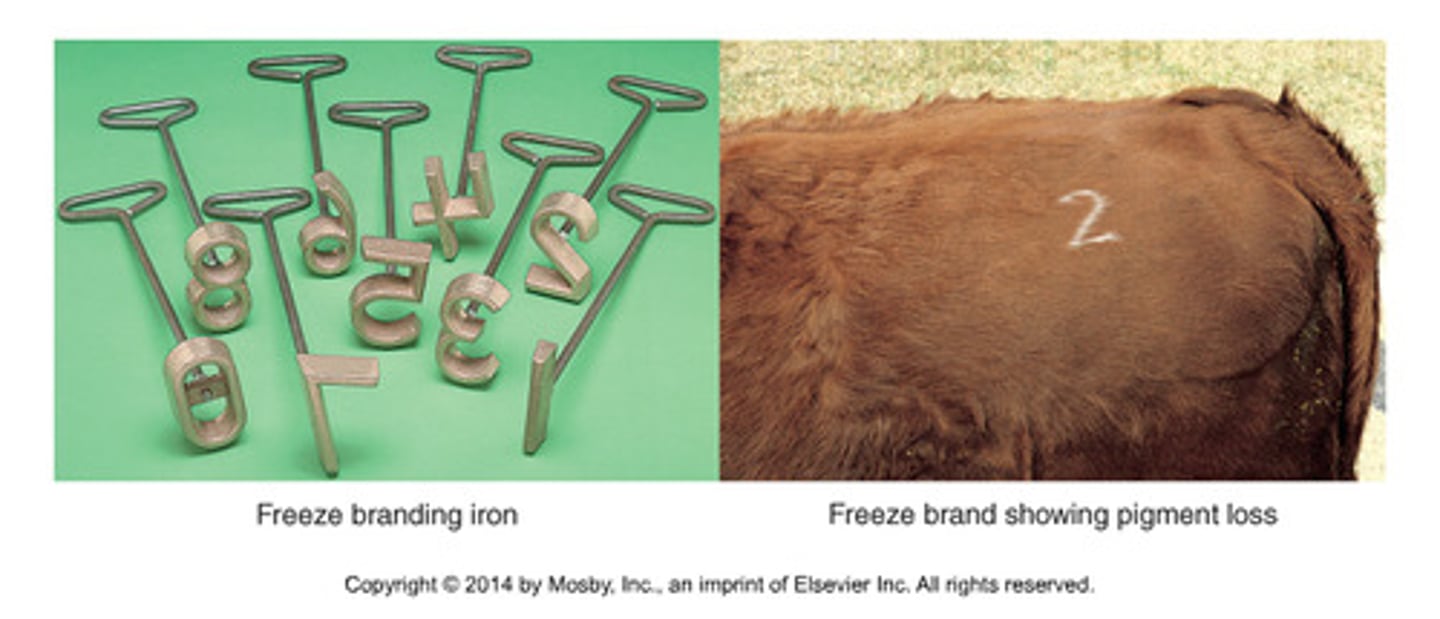
Tattooing
-permanent, low cost
-inside the ear
Cattle restraint methods
-chute/ headgate
-halter
-tail jacking
-nose rings
-hobbles
-casting
Sheep restraint methods
-Stanchion (medication administration, shearing, exams)
-straddling/rumping for hoof trims
-flanking
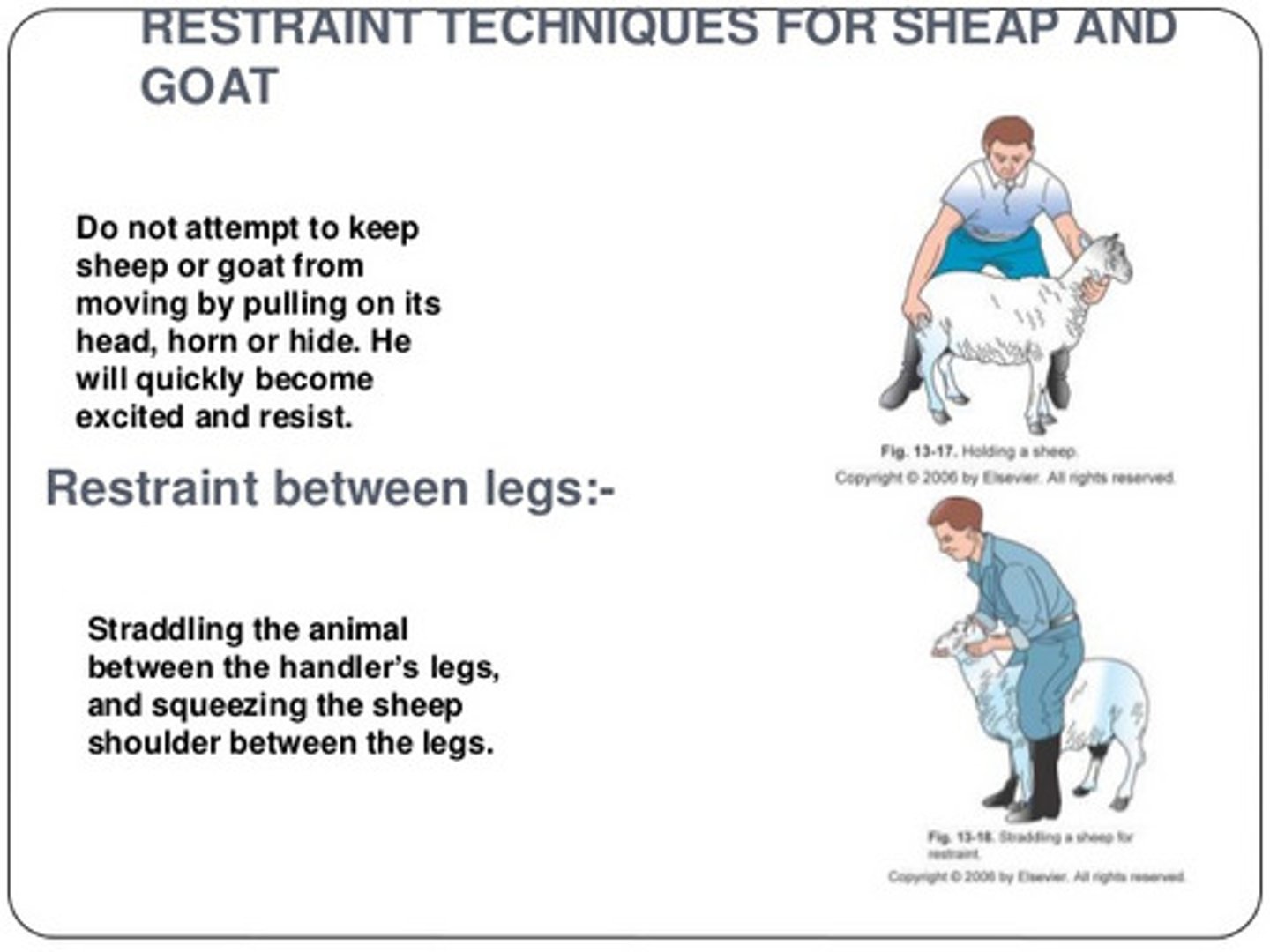
Pig restraint methods
snout snare or pig board
How do goats differ from sheep?
-they stress more easily
-can become aggressive towards each other
-if they get scared they will lay down and sulk
Wind sucking in horses
can cause dental problems and colic
Behavior
the way in which an animal or person acts in response to a particular situation or stimulus
Communication
the response of one animal to the signals sent out by another.
Social communication
a process by which the behavior of an individual affects the behavior of others
Redirected behavior
a behavior that has a communication value but was originally developed for another purpose such as pawing, suckling, etc
What are the 2 common markings?
-urine
-anal sac secretions
Female dog urine
urine of an estrous female dog is the most powerful form of marking
- can attract males from far distances
Most common pottying timeframe
-after sleeping
-after eating
-after drinking
-after playing
Canine auditory communication
-howling
-growling
-whining
-barking
Canine visual communication
-stance
-posture
-eyes
-facial expression
-tail position
How many litter boxes do you need?
1 per cat + 1 additional box
Common feline restraint methods
Towel
Cat Bag
Cat muzzle
Standing Restraint
Sternal Restraint
Head Restraint
Scruffing
What is something that elicits an unconditioned response?
unconditioned stimulus
What is the correct definition for positive punishment?
adding something aversive to decrease the likelihood of an unwanted behavior
What is the standard size for a regular stall for a horse?
12x12 ft
True or False: The point of balance is an imaginary line that is perpendicular to the animals body
TRUE
What type of learning is known to require the most intelligence?
conceptual learning
All phrases, tools, or actions that fall under the Fear Free Care : Environment
Calming music, prevent social interaction among patients, and nonslip surfaces
All phrases, tools, or actions that fall under Fear Free Care : Client interaction
ask about known fear triggers, ask about provider, ask about patients favorite treats
Which drug that is used to treat anxiety and depression is used for patients dealing with a cognitive dysfunction syndrome?
Monoamine oxidase inhibitor
What are two programs that focus on low stress veterinary practices?
-Fear free pets
-Low stress handling university
A dog is sleeping. What number FAS is this considered by Fear Free Pets?
FAS 0
Elizabethan collar (E-collar)

Describe a horse's facial expression when it is in pain.
lowered ears that are rotated backward, an intense eye stare, contraction of muscles around the eye, and strain around the horse's mouth
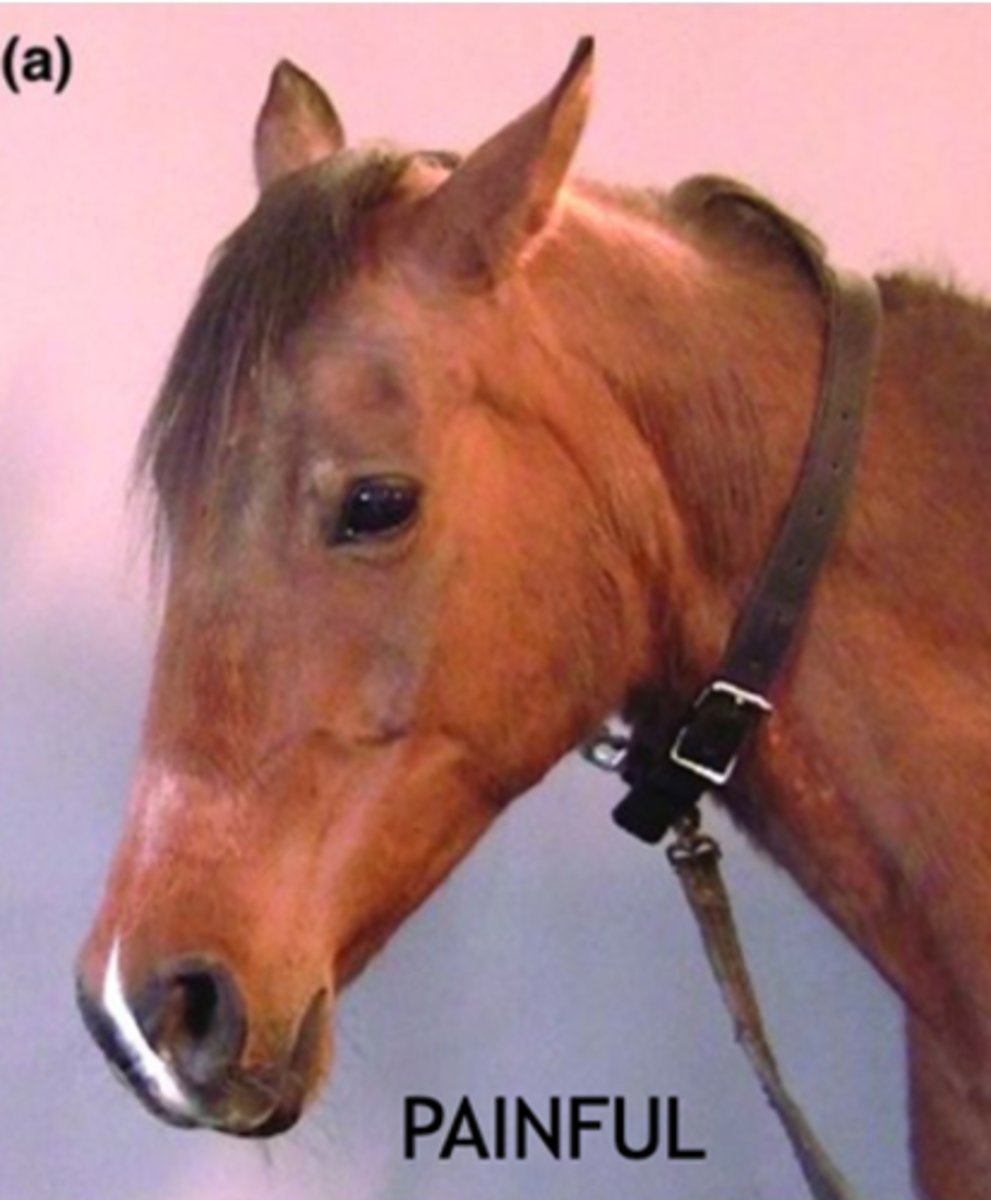
Which restraint method for equine prevents kicking or striking?
Stocks
How do you restrain a foal?
cradle the baby with one arm around the chest and one arm around the hind end...do not use halters.
Where are dairy calves housed?
hutches
Development is known as a _________________
continual process
What characteristic is known in the transitional phase of behavioral development?
Rapid maturation of senses
What age range do dogs socialize with humans the best?
5-12 weeks
What are the 4 components of classical conditioning?
unconditioned stimulus
unconditioned response
conditioned stimulus
conditioned response
An owner trains their dog to sit, stay, and come when the owner commands it to. What is this an example of?
Chaining
What is discrimination learning?
When animals learn to discriminate between various visual, auditory, or tactile cues
What animal is imprinting irreversible in?
Ducklings